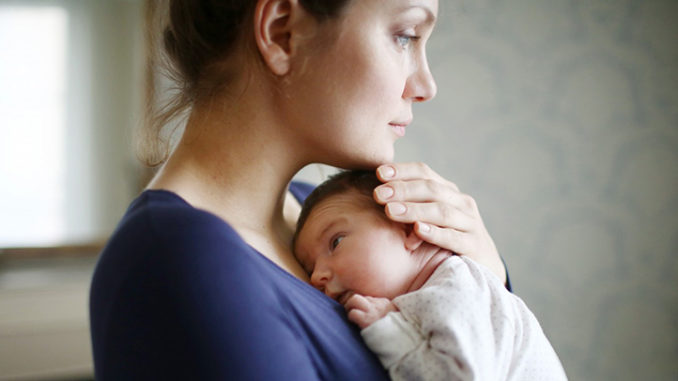
By Nora Heston Tarte
You’ve just given birth to your brand-new baby, and you should be on cloud nine, but what if you can’t stop feeling down? Your hormones are waging war on your body, you’re still recovering from the birthing experience, and you aren’t quite feeling yourself. While many women experience a range of emotions in the weeks post-birth, there could be more to your feelings. If you can’t quite shake the funk, consult your doctor. You may be suffering from Postpartum Depression (PPD).
A Centers for Disease Control (CDC) survey found that 8-19 percent of women suffered from frequent postpartum depressive symptoms, including trouble sleeping while baby sleeps, having scary or negative thoughts about the baby, and feeling guilty about not being a good mom or ashamed that you cannot care for your baby (in addition to traditional depression symptoms).
Some women are at higher risk for developing PPD than others. “Patients at risk are those with external stresses such as financial issues, lack of support, abusive relationships, and previous history of postpartum depression,” says Ben Rodgers, OB, MD, at San Joaquin General Hospital in French Camp.
So what can you do? Bonding with your baby is one way doctors suggest treating PPD. “Staying close to the baby and especially breastfeeding when you have PPD helps to release a natural hormone called oxytocin. Oxytocin helps with bonding with the baby and developing warm, loving emotions toward your baby,” says Dr. Eugenia Hurlbut at Gill OB/GYN Medical Group, Inc. in Stockton.
The first step to recovery is diagnosis, and the earlier a mother can get help, the better chance she has to overcome PPD. While in the hospital, patients are assessed during the immediate postpartum period in daily rounds. During this time, hospital staff will pay special attention to potential stressors that could trigger postpartum depression. Patients are also screened for PPD risk during their pregnancy, according to Dr. Rogers. A short follow-up one or two weeks after discharge is often used to reassess.
Get Help:
Gill OB/GYN Medical Group, Inc.
1617 N. California St., Ste. 2A, Stockton
(209) 466-8546
GillObgyn.com
San Joaquin General Hospital
500 W. Hospital Rd., French Camp
(209) 468-6000
SjGeneral.org

